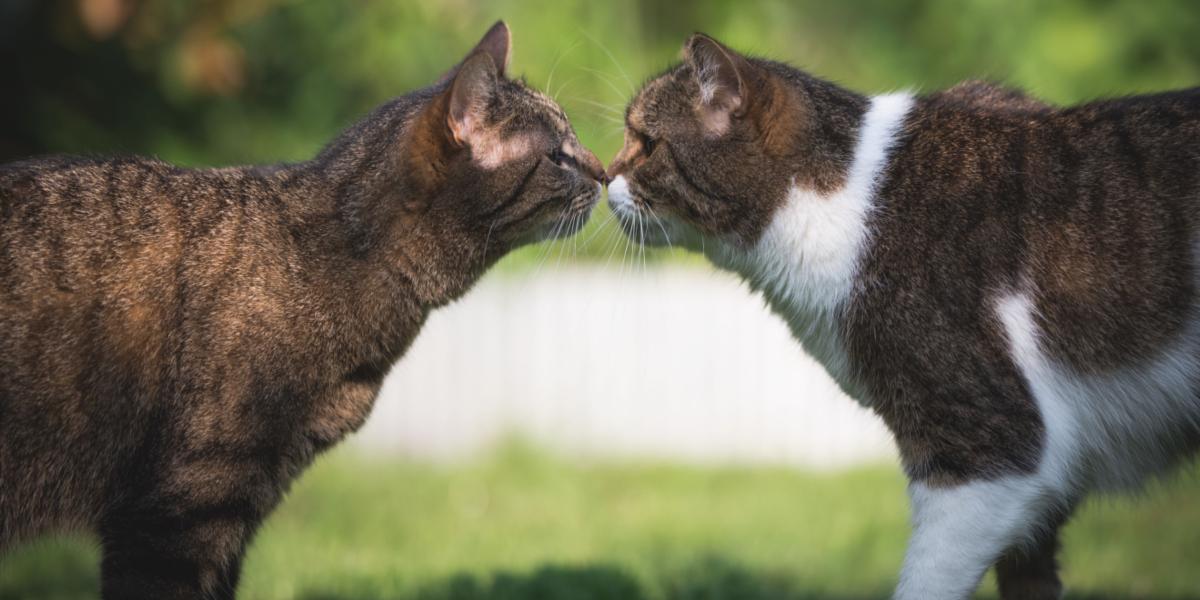
Cat pheromone products are becoming increasingly popular, and are marketed for all sorts of feline unwanted behaviors, from scratching furniture to urine spraying and even aggression.
Pheromones are chemicals, released by glands across a cat’s body and used as messages between cats. These pheromones have now been manufactured synthetically and can be bought as a diffuser or as sprays, to be used in situations such as a fireworks fear or for urine marking in the house.
But you may be wondering, do they work, and how can they help your cat? Read on to find out!
What Are Pheromones?
Cat pheromones are scent chemicals, released by special scent glands all over your cat’s body, including their cheeks, paws, and chin. Your cat, and others, can then ‘smell’ these chemical signals using a special organ called the vomeronasal organ, located on the roof of their mouth.
You may have noticed your cat sniffing areas in your home with their mouth slightly open and their lips pulled back. This is the “flehmen response” and is a sign that they are smelling pheromones.
Pheromone communication is complicated—feline facial pheromones alone contain more than 35 different chemicals!
However, all cats understand pheromone communication, from kittens to elderly cats. In fact, mother cats release pheromones to bond with their kittens.
How Do Pheromones Work?
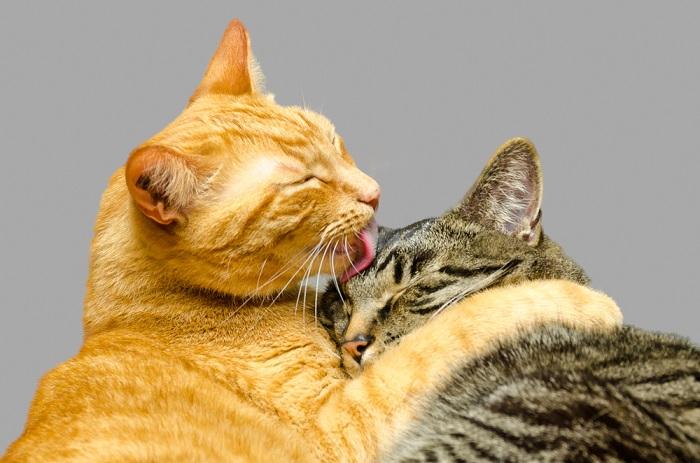
Cat pheromones are colorless and odorless, and act as chemical signals between cats.
These chemical signals play a hugely important role in feline communication and behavior. Pheromone glands are mostly found around the face, including the chin, cheeks, forehead, mouth, and lower ears.
There are also scent glands in the paw pads and around the nipples of female cats, and pheromones are also released into the urine. The pheromones are released when your cat rubs its face and body on you, other pets, or objects; scratches or claws at items; and by urine spraying.
Pheromones can communicate a whole range of different messages. These include:
- Marking territory
- Establishing a bond or increasing familiarity
- Learning about other cats
- Sexual signals about potential mating
- Mother cats communicating with their kittens
- Identifying home comforts and safety
- Alerting to tension, signaling anxiety or fear
- Self-soothing, providing a comfort zone
How Can We Use Cat Pheromones?
Scientists have developed synthetic forms of cat pheromones, and these pheromone products can be purchased in the form of plug-in diffusers and sprays.
Synthetic pheromones mimic your cat’s natural chemical signals, meaning we can influence their use in our homes (with a diffuser) or out and about (with sprays) to help enrich our cats’ happiness and prevent unwanted behaviors.
There are three main types of pheromone messages that have been developed, for use in different scenarios.
‘Happy’ Pheromones
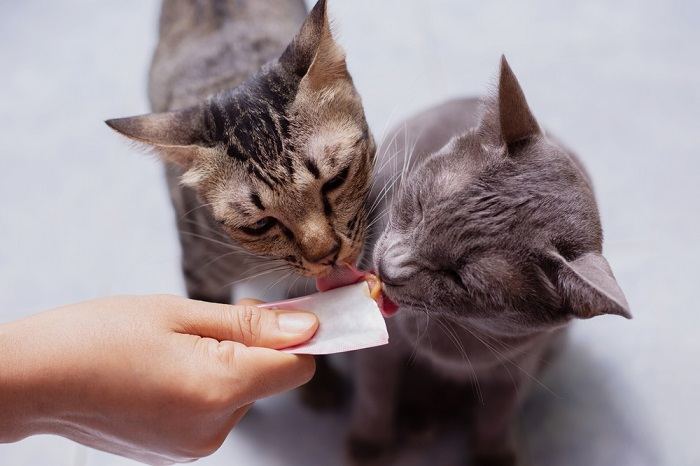
The feline facial pheromones (f3) are comforting and calming pheromones and help cats feel secure and happy. Synthetic f3 is found in the pheromone product Feliway Classic and is useful for multiple types of stress-related behavior, such as urine spraying outside the litter box, hiding away, and even aggression.
It can be used for known stressful situations, such as fireworks, trips in the cat carrier, or by continuously using one of the plug-ins (with refills) for ongoing anxiety issues.
‘Harmony’ Pheromones
Cat appeasing pheromones (CAP) are produced by mother cats to help induce bonding between kittens. These are now available as synthetics, such as in Feliway Multicat or Feliway Friends, and can help with cats’ social issues.
Cats in multi-cat households are more prone to stress, which can lead to unwanted behaviors such as hissing, chasing, and aggressive behaviors. Appeasing pheromones can help restore harmony and ease tensions between cats.
‘Territory’ Pheromones

Cats are territorial and leave signals about their boundaries to other cats using urine marking and scratching. If your cat is stressed, perhaps due to other cats nearby, using territorial pheromones such as in Feliscratch by Feliway can help them feel secure in their own home and prevent urine spraying and excessive scratching.
Do Synthetic Pheromones Actually Work?
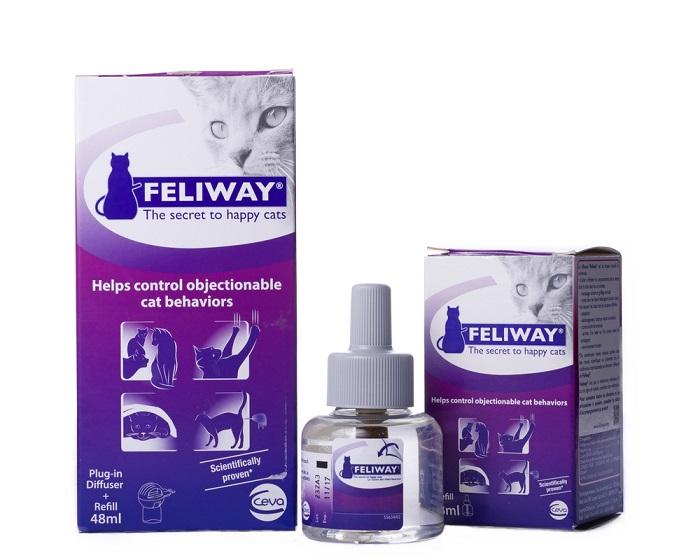
The use of Feliway may reduce both inter-cat aggression and stress-related behaviors in cats.
The theory seems sound, right? But do these synthetics help? There isn’t a huge amount of evidence available, but there are some studies that have looked at the effect of using cat pheromones such as Feliway.
A 2018 study found that the use of Feliway reduced both inter-cat aggression and stress-related behaviors in cats in multi-cat households. However, the owners who participated in the study also had training about cat behavior and some basic behavior modifications, so it is impossible to tell exactly how much direct effect the pheromones had.
There are multiple symptoms of anxiety in cats, but urine spraying is both a common sign and one that owners find hard to manage. A study in 2011 found that Feliway reduced urine spraying frequency after four weeks of use.
The causes for the inappropriate urination were different between cats but a general improvement was seen in most. However, it is again worth noting that the best improvement was seen in the group with both pheromonal input and behavioral management.
Dogs also use pheromones, and an interesting study in 2020 looked at using pheromones in households with both cats and dogs, using both cat and dog pheromones. Both species pheromones led to improved inter-pet relationships and reduced anxiety in both cats and dogs.
These studies are all hugely encouraging that the use of pheromones can be beneficial for those cats who are suffering from some form of stress. However, it is worth noting that the causes of stress are many and varied, and pheromones may not be suitable for all circumstances. It is always best to consult with a veterinarian if you are concerned about your kitty.
When Should I Use Feline Pheromones?
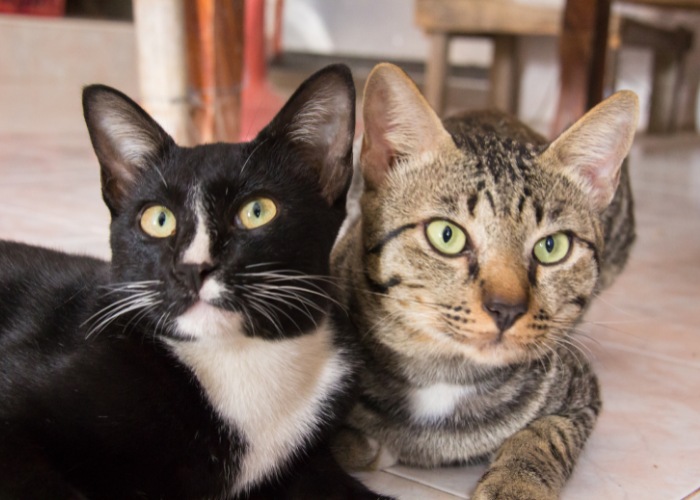
Stress in cats can have serious consequences for both health and behavior, and should not be taken lightly. Pheromones can be a wonderful help to some cats, but more severe cases of anxiety may need intense behavioral therapy and even medication.
If your cat seems healthy and happy, but you have a potentially stressful event occurring, such as a fireworks show or a trip to the veterinarian, then pheromones may be a useful intervention to minimize anxiety for your cat.
However, if your cat is showing more marked signs of problems, such as urine spraying, excessive meowing, scratching, or aggression, it is always advisable to book a checkup with the vet. This is necessary to rule out any health concerns, and to discuss an ongoing plan for your kitty.
Summary
Cats use pheromones—chemical scent signals—to pass messages to themselves and other cats. These pheromones have now been produced synthetically and are available as a diffuser or a spray.
They can be helpful in a variety of situations to help your cat feel calmer, more in harmony with other pets, and secure in their own environment. There is some evidence that they are useful in modifying behavior, but are best used as part of a wider behavioral plan for more severe cases of feline stress.
Frequently Asked Questions
Do pheromones really work for cats?
Some studies show that using synthetic pheromones does reduce stress-related behaviors and anxiety in cats. However, they are often best used alongside behavioral and environmental modification, especially in more severe cases.
What do pheromones do for cats?
Pheromones are scent messages, and can convey a variety of meanings: comfort, safety, familiarity and bonding, territorial boundaries and they can even alert to danger. Using synthetic pheromones generated to induce feelings of happiness, safety, familiarity, and comfort can help cats feel more relaxed in stressful situations, and more secure and comforted in their home.
Where should I spray cat pheromones?
This depends slightly on the problem you are seeking to help. Generally, anxious cats may benefit from a diffuser that will spread the pheromones around your entire house, so that their home environment is full of calming signals. If there is a specific trigger for your cat’s anxiety, such as a cat carrier, you can spray synthetic pheromones directly onto these objects.
Can humans smell cat pheromones?
No, people cannot smell cat pheromones. Cats use a special organ (the vomeronasal organ) on the roof of their mouth to sense pheromones, which humans do not have. All cats will be able to interpret feline pheromones, but they are species specific.
-
Mills, D.S., Redgate, S.E & Landsburg, G. (2011) ‘A meta-analysis of studies of treatments for feline urine spraying’ PLoS One 6 (4)
-
Mills, D.S. & Prior, R. (2020) ‘Cats vs Dogs: The efficacy of Feliway Friends and Adaptil products in multispecies households’ Front Vet Sci 7 (399)
-
DePorter, T., Bledsoe D., Beck, A. & Ollivier, E. (2019) ‘Evaluation of the efficacy of an appeasing pheromone diffuser product vs placebo for management of feline aggression in multi-cat households: a pilot study.’ J Feline Med Surg 21 (293-305)
-
DePorter TL, Bledsoe DL, Beck A, Ollivier E. Evaluation of the efficacy of an appeasing pheromone diffuser product vs placebo for management of feline aggression in multi-cat households: a pilot study. Journal of Feline Medicine and Surgery. 2019;21(4):293-305. doi:10.1177/1098612X18774437








A 2018 study found that the use of Feliway reduced both inter-cat aggression and stress-related behaviors in cats in multi-cat households.
Citation?
Hi Rich,
We added the citation
Have you review Jackson Galaxy’s Holistic Solutions?
When you first adopt a cat and bring it home sounds like a good time.